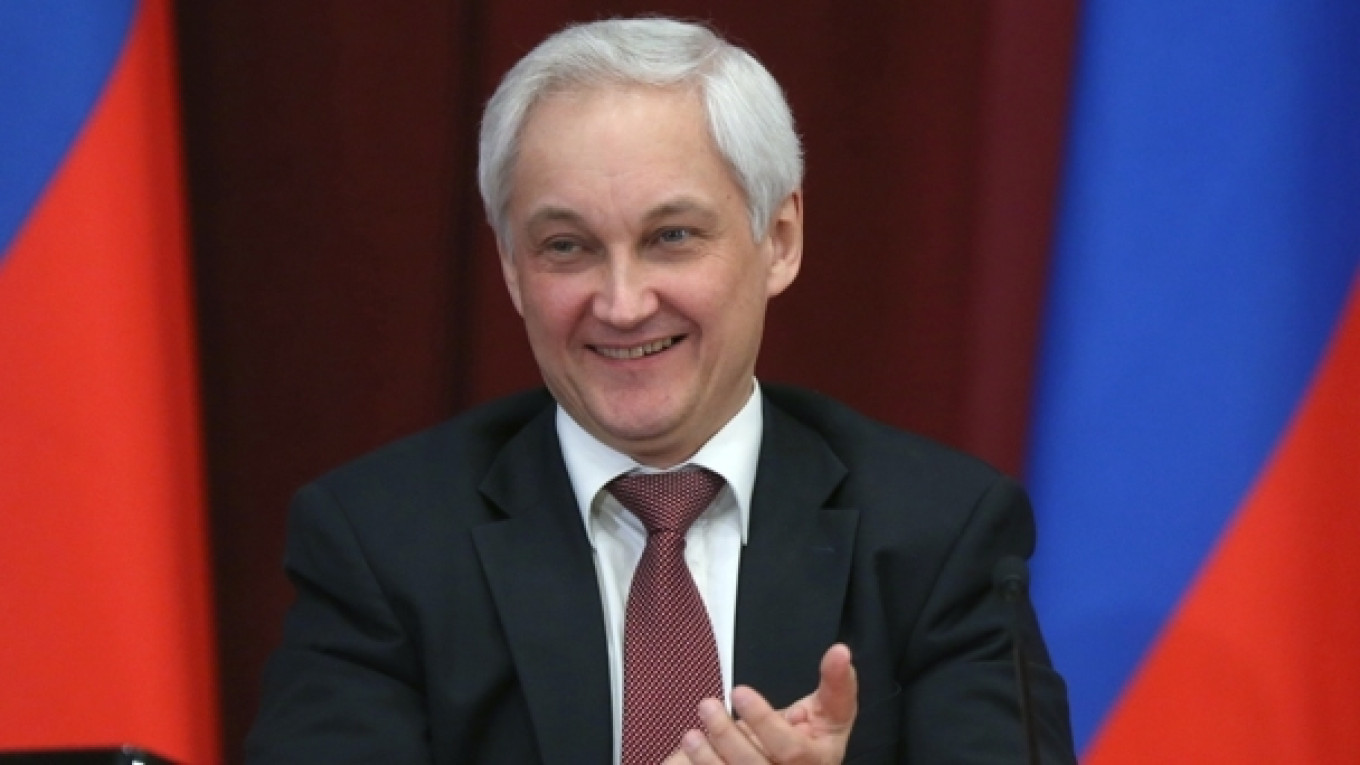Russian officials on Wednesday lined up to dismiss the economic impact of Western sanctions imposed for Moscow's role in the Ukraine crisis, saying they were "peanuts" compared to what their country had to face during Soviet times.
In a show of unity a day after an ally of President Vladimir Putin warned that Russia's anti-Western rhetoric could derail the economy, ministers said growth had not been dampened by the sanctions which include measures against some major companies.
The economy is on the brink of a recession as a result of the sanctions and a broader risk aversion towards emerging markets that have sent equities and the ruble tumbling and spurred nearly $75 billion in capital flight so far this year.
"The sanctions in their current format don't have a macroeconomic effect," Andrei Belousov, the Kremlin's top economic adviser, told journalists.
"My assessment is that we're in the vicinity of 1 percent (gross domestic product growth) and will stay there until the end of the year."
Trade Minister Denis Manturov said the measures by the West could not drive Russia into the isolation of Soviet times.
"What sanctions? A holy place is never empty: if one market closes, another opens," he told journalists. "What's happening today is peanuts compared to what was then."
The comments came after Alexei Kudrin, a long-time friend of Putin, criticized the government's policies and the growing conservatism around the Kremlin — rare criticism in a country where officials usually speak with one voice.
A former finance minister, Kudrin quit in 2011 in protest at a government proposal to raise military spending, but Putin still summons him to the Kremlin to discuss economic issues.
Saying Moscow should not intervene in eastern Ukraine, he estimated that sanctions so far had cost Russia about 1 percent in GDP growth. More measures would be more painful and felt by businesses and ordinary Russian alike, he said.
"The impact will be as follows: the deterioration in GDP growth by a few points for a few years, the decline in real income and lower wages," Kudrin told state news agency ITAR-Tass.
Belousov's 1 percent growth forecast for the year is much higher than the 0.2 percent estimates by the International Monetary Fund and that of many economists working in Russia.
Sergei Guriev, an economist who fled Russia last year after criticizing the Kremlin, said Belousov's assessments were unrealistic. "Kudrin is right," he said.
In Washington, a senior U.S. official welcomed Kudrin's critique as a sign of "discomfort" in some quarters over Putin's policy and the impact of Western sanctions.
"It's pretty extraordinary to have Russian figures coming out and questioning the course of action," the official said. "It's that kind of questioning that we want to make clear to the Russian leadership they have to address."
Fear of Speaking Out
The zero GDP growth seen in the second quarter followed a decline in the first three months of the year, hurt by plunging investment by Russian firms where owners are increasingly worried about the future and access to foreign funding.
Many have been worried to speak out against the Kremlin, fearing they may have to follow Guriev or meet the fate of Mikhail Khodorkovsky, once Russia's richest man who was imprisoned for nearly 10 years for speaking out against Putin.
The oligarchs and the super-rich who constitute no more than 2 percent of the population but control a vast share of the country's economy, have remained silent.
"Yes, they are very worried," said a Russian economist who asked not to be identified.
Kudrin, who helped the state to amass more than $160 billion in two funds that now serve as a contingency plan for a financial crisis, has always been allowed to say more than most.
He has known Putin for decades and has been a close ally since both worked for the local government in St Petersburg.
"He is a friend of Putin and there is an understanding that as long as he is within certain limits he can publicly criticize the government, although probably not the president," the economist said.
See also:
Moody's: Russia Sanctions Hamper Rosneft, Gazprom Debt Refinancing
A Message from The Moscow Times:
Dear readers,
We are facing unprecedented challenges. Russia's Prosecutor General's Office has designated The Moscow Times as an "undesirable" organization, criminalizing our work and putting our staff at risk of prosecution. This follows our earlier unjust labeling as a "foreign agent."
These actions are direct attempts to silence independent journalism in Russia. The authorities claim our work "discredits the decisions of the Russian leadership." We see things differently: we strive to provide accurate, unbiased reporting on Russia.
We, the journalists of The Moscow Times, refuse to be silenced. But to continue our work, we need your help.
Your support, no matter how small, makes a world of difference. If you can, please support us monthly starting from just $2. It's quick to set up, and every contribution makes a significant impact.
By supporting The Moscow Times, you're defending open, independent journalism in the face of repression. Thank you for standing with us.
Remind me later.


